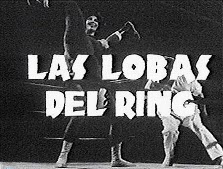

[She-Wolves of the Ring]
(Cinematográfica Calderón, 1964) Prod: Guillermo Calderón Stell; Dir: René Cardona [Sr.]; Scr: Jesús "Murciélago" Velázquez; Photo: Enrique Wallace; Music dir: Antonio Díaz Conde; Prod Mgr: Luis García de León; Prod Chief: Jorge Cardeña; Sub-Dir: Jaime Contreras; Film Ed: Jorge Bustos; Art Dir: José Rodríguez Granada; Makeup: Felisa L. de Guevara; Sound Supv: James L. Fields; Dialog Rec: Eduardo Arjona; Sound Ed: José Liho; Re-rec: Galdino Samperio; Union: STPC
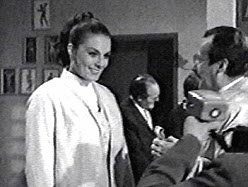
CAST: Lorena Velázquez (Loreta Venus), Elizabeth
Campbell (The Golden Rubí), María Eugenia San
Martín (Susuki de la Mora), Sonia Infante (Sonia "La
Borrada"), Héctor Godoy (Luciano), Eric del Castillo
(Bernardo), Pompín Iglesias (Pompín), Nacho
Contla (Nacho), Rosa María Gallardo (Toña
Rubio), Celia Viveros (Malena), Jesús
"Murciélago" Velázquez (Murciélago), Roxana
Bellini, Jorge Russek (Bronco), Perla Welter, Emma Arvizu
(Pantera), Emma Roldán (Loreta's mother),
Julién de Meriche, Jorge Mondragón (arena owner);
wrestling impresarios: Manuel Garay, Victorio Blanco, Armando
Gutiérrez; N. León "Frankestein" (Alfonso, henchman),
Gerardo Zepeda (henchman), Juan Garza (henchman),
Benjamín Ceja (Delfín), Manuel "Gordo" Alvarado
(TV announcer), "Pícoro" (ring ancr), Manuel
Dondé (arena employee); women wrestlers: Martha
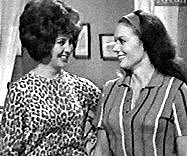 Solis, Marina Rey, Chabela Romero, Refugio González; men
wrestlers: Black Shadow, Cavernario Galindo, René "Copetes"
Guajardo, Ray Mendoza, Hombre Montaña, Gerardo "El Romano," Reyes
Oliva, Dorrell Dixon; Armando Acosta ("I want to see blood!"
man)
Solis, Marina Rey, Chabela Romero, Refugio González; men
wrestlers: Black Shadow, Cavernario Galindo, René "Copetes"
Guajardo, Ray Mendoza, Hombre Montaña, Gerardo "El Romano," Reyes
Oliva, Dorrell Dixon; Armando Acosta ("I want to see blood!"
man)
NOTES: this is one of the least interesting of the Luchadoras series, a straight wrestling drama written by Jesús Velázquez rather than Alfredo Salazar (curiously, there is one dialogue reference to "la momia," the preceding film in the series). There are no fantasy elements and no masked wrestlers of any significance to the plot. This leaves far too much ring action which intercuts scenes of Lorena Velázquez, Sonia Infante, Elizabeth Campbell, et al., with their (inevitably) stockier wrestling doubles, plus some mild crime action and very lame comic relief courtesy of Pompín Iglesias, Nacho Contla, and Celia Viveros. The best thing about the picture is Elizabeth Campbell, who is intended to be secondary to Lorena Velázquez in importance, but comes off much better in almost every way.
In order to promote public interest, a group of wrestling promoters agree to sponsor an elimination tournament of women wrestlers, with a one million peso top prize. One group of women wrestlers is led by Loreta Venus and her friend from the USA, The Golden Ruby. They agree to share the prize among them, regardless of who actually wins. Sonia la Borrada and Tonia Rubio are part of a rival group of luchadoras (the dirty fighters). Sonia's brother is gangster Bernardo, and he agrees to help his sister's cause. The gangsters kidnap Susuki de la Mora on the night of her match. Malena substitutes and loses. Loreta and Ruby advance in their brackets, but Ruby is drugged before her second match, and loses to Sonia. Tonia figures out that Sonia and Bernardo are planning to double-cross the rest of the gang and keep all of the prize money; she threatens to go to the police, so Bernardo murders her.
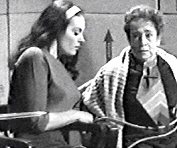
On the night of the championship match, between Loreta and Sonia, gangsters kidnap Loreta's mother and Ruby. Loreta is told she must lose the match or her mother will be killed. However, Ruby manages to surreptitiously call Murciélago, an old wrestler friend. He and his associates--in a scene "borrowed" from Huracán Ramírez (1952)--crash into the crooks' hideout and free the two women. They arrive at the arena and Loreta goes on to win the match. Bernardo, fleeing from lady wrestler Chabela Romero (whose father he had murdered, years before), clumsily bumps into some electrical wires and is killed.
There are some unusual (not to necessarily say good) scenes in Las lobas del ring. In one sequence, Cavernario Galindo and Murciélago are discussing their long ring careers. They never had the chance to wrestle for a million peso prize; with tears in his eyes, Galindo says "wrestling is like a beloved woman you see in the arms of another. We look at her but have no hope that she will return to us." Murciélago challenges him to a friendly wrestling match, "so our tears and our sweat can intermingle."
The Chabela Romero sub-plot is odd: normally, one of the two protagonists would be given this type of "backstory" motivation. Instead, Chabela (who can actually act, more or less) is the one who says she became a wrestler after her father was murdered by gangsters, and she is the one who loses her match to Sonia when she spots Bernardo--the killer--in the audience. And she is the one who chases Bernardo through the arena at the climax, punching and kicking him until he finally ducks into a closet which houses some electrical wires and ZZZTTT!!!
Another point, which Emilio García Riera also notes, is that Susuki's fate is never made clear. She's kidnaped; later, Bernardo orders one of his henchmen to take her out into the countryside and kill her (he also sends another henchman to kill that guy). However, we don't know if this was ever carried out, but Susuki is certainly not among the good women wrestlers celebrating at the conclusion!
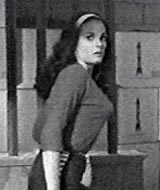
Lorena Velázquez is given a mother and a boyfriend in her role
as Loreta Venus, and she also gets to win the championship; however,
watching the film today, one cannot help but be more impressed with
Elizabeth Campbell. First, Campbell is very beautiful (Velázquez
isn't bad, but she has that poofy '60s hairdo), and she is really feisty
in the (non-wrestling) fight scenes. When the crooks burst in to kidnap
Loreta's mother, Campbell lays into them (wearing a great set of capri
pants and a tight top), felling two of the thugs before getting whacked
with a blackjack. In the hideout, she keeps on fighting them, chews at
the ropes binding her to a chair, then fights again (but is knocked out by
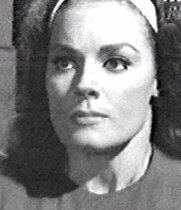 Jorge Russek). Campbell is once more paired with a short comedian
"boyfriend," and pulls the same old comedy stunt, lifting him up in the
air (in another scene, Pompín is a head taller than Campbell, until
the camera pulls back to show him standing on the lip of a park fountain).
As usual, Campbell does her own dialogue in perfectly satisfactory
Spanish, and generally shows a lot of star quality.
Jorge Russek). Campbell is once more paired with a short comedian
"boyfriend," and pulls the same old comedy stunt, lifting him up in the
air (in another scene, Pompín is a head taller than Campbell, until
the camera pulls back to show him standing on the lip of a park fountain).
As usual, Campbell does her own dialogue in perfectly satisfactory
Spanish, and generally shows a lot of star quality.
Most of the other performers are fine. There is almost a hint of incest between Sonia and Bernardo; Sonia Infante and Eric del Castillo are quite good as the sneaky sister and brother team. Héctor Godoy has a nothing role as Loreta's medical student boyfriend. The most offensive performances are Celia Viveros and Nacho Contla as the poet-wrestler Malena and her aging boyfriend Nacho. Malena's constant physical abuse of Nacho is supposed to be amusing, but isn't, and his final revenge against her is similarly unfunny.
Production values are adequate. One point to mention is that some of the supporting male wrestlers had their dialogue post-dubbed (but not all of them). Murciélago Velázquez and Cavernario Galindo, however, do their own talking.
Overall, an adequate sports drama, but not nearly as entertaining as
the Luchadoras movies with fantasy elements.
Back to the Elizabeth
Campbell Page.
Review posted 3 Oct 2000 by D.Wilt (dwilt@umd.edu). Vid caps added 10 Nov 2000. Images (c) Cin. Calderón.